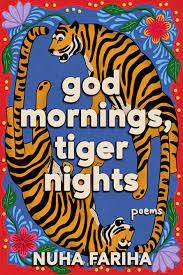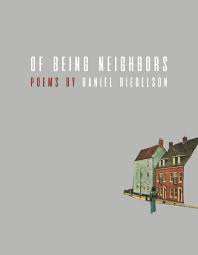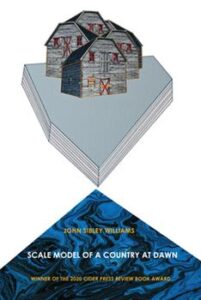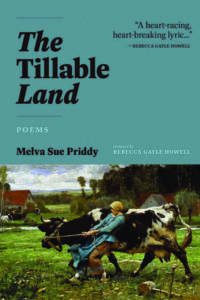Review by Jeremy Michael Reed // August 14, 2019
The Barbarous Century by Leah Umansky
Eyewear Publishing, March 2018 // 106 pages, £10.99
High Ground Coward by Alicia Mountain
University of Iowa Press, April 2018 // 112 pages, $19.95
Ceremonial by Carly Joy Miller
Orison Books, May 2018 // 104 pages, $16.00
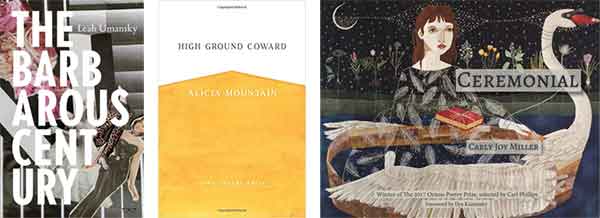
As 2019 began, I found myself looking to books from last year to better understand how to live. How do we understand ourselves in real time, in the moment, as we make decisions that will affect the facts of our lives, as we connect ourselves with myths, metaphors, and symbols that are important to us? In asking this question, I’ve found myself thinking of three poets in particular which I hope you return to as well.
Leah Umansky’s second full-length collection, The Barbarous Century, is set firmly in twenty-first century America, tracing our collective consciousness (from Twitter to politics to television shows) from a singular woman’s perspective. Split into three sections, the collection begins in a position of uncertainty about the narrator’s self in relation to others and the world she inhabits. In one poem she writes, “Here, coordinate my sprawling,” and in the next “To what edge can we cling? // This has affected me. / This pause is alive.” The speaker’s uncertain positioning brings with it a desire to understand the past and one’s relationship to it, to understand the present as if from the future, with clear-eyed hindsight.
The uncertain relationships set up in the first section engender Umansky’s turn to the second, one primarily concerned with looking through the “eyes” of two culturally significant legends in order for the narrator to gain a renewed sense of self-determination: Game of Thrones and Mad Men. By imagining points of view through these show’s characters and imagined worlds, the narrator gains new character strengths for her own story, as Umansky accomplishes in her Khaleesi poems, for one example. In “Khaleesi Says,” the narrator states:
In this story, fear is a house gone dry.
Fear is not being a woman.
I am no ordinary woman, she says,
My dreams come true.
and she says and she is
and I say, yes, give me that.
After the gaining of new strength in the second section, the third returns to self, and a rediscovery that hard-fought and often-fractured love connects the individual to human relationships and the present.
The narrator of The Barbarous Century attempts several ways to construct a habitable world for herself so she can live into a happy, full, and open-ended future. She attempts to see and be seen by those around her, to understand the myths and legends of the past and of today. In the end, she simultaneously needs to find new ways to approach reality head-on and find side ways out of reality to rest, recuperate, and reexamine, before returning. By the end of the book, I came to see a real strength in showing these internal negotiations with the self before, during, and after seeing the self’s different iterations reflected in contemporary cultural legends, as it allows the book’s readers to see those negotations happen in real time. After all, as Umansky writes in “Heart,” “This self is all I’ve got.”
Alicia Mountain’s debut full-length collection High Ground Coward establishes a singular aesthetic world in the West, stretching from California to Montana and Idaho: declarative while simultaneously distanced and speculative, desiring of a specific lover yet self-questioning and expansive in its depiction of each “you,” extremely attentive to each character’s lived differences and yet sometimes seeing double (“I can’t meet anyone new. // Two men named Mackenzie, / Lita with the eyes and posture / of someone cruel from college”). Mountain’s book, in one continuous section from beginning to end, follows various themes as they rise and fall, allowing space for people and concerns to dissipate, recur, be questioned, and shift. Throughout, the speaker shows a vested interest in “spread[ing] arms to say just this.” The courage to do so comes through one’s relationships with others and an understanding that metaphor can be both a method of self-understanding and a way to hide. This multiplicity embeds Mountain’s book with a large-hearted and imaginatively rich sense of possibility and inclusion that remains suffused with a sense of loss.
Reading this book, I sensed a kinship with Mountain’s narrator: that at the times in my life like the ones that produced her narrator’s seeking for non-metaphor, for stating the fact and not the symbol, I too am not sure how to tell the difference between oasis and mirage, between hunger and recovery, between desire and contentment. In those times, I am both comforted and afraid to realize, alongside Mountain, the urgency in those very real tensions and the desire to know them by describing them in metaphoric language: “I know we’ve got animals in us like a house on fire. / They smell the smoke and they’re digging at the doorframe.” The world of metaphor remains important while we recognize its limits: an avalanche can kill, be the least poetic of images, and still be an emotion, experienced or awaiting each of us in different measure. Mountain’s narrator tells us to be at peace as we ask ourselves how we desire symbols to understand life at a distance and want desperately the lived, physical experience of the surface of our thoughts and bodies. We attempt in each way to be not entirely separate from ourselves, even when the “you” of our individual life stories ruptures, breaks, avalanches, or returns.
Like Umansky and Mountain, Carly Joy Miller takes up the same concerns about negotiating life as one lives it in her debut full-length collection, Ceremonial. Differently from Umansky and Mountain, however, Miller’s narrators directly take up the symbolic heft of rivers, drowning, what it means to be animal, what it means to know one’s own body, and transform them into new shapes. As she writes in “Lost Girl Wails Swan Song,” “Trust in this: / wings sprouted from my shoulder blades. / I glide on water.” Each poem creates a kind of ceremony, a structure for the reader to see and speak through that shifts their way of relating to their living. Most often, Miller begins this shifting by a concrete, lived instance of tension or by questioning in romantic relationship, that then opens up into a newly changed connection with forms of belief such as faith or prayer, or understanding of self as a woman and as a human. Throughout this book’s three sections, Miller’s narrators contemplate and change their relationships with wildness inside themselves, a relationship always somehow a bit out of reach. As she writes in “Anti-Pioneer”: “This is where the wild fluttered out / as soon as I staked the land as mine.”
Yet, even with the ungraspable quality of questions Miller’s poems ask, her ceremonies helped me think more clearly about how the language I speak, hear, read, and write all remains in kinship with my body, my past, and my imagination. The best I can put it is to show another example from her poem “Letter to Body Made of Breath”:
All that labor.
I’ve made a myth of it.
Dress billow-whips
my knees. Breathe:
body arch. Breathe:
body flutter. Breathe:
we linger. At the end
of anything, a lift.
Believe or leave
a breath–
ABOUT THE REVIEWER
Jeremy Michael Reed holds a Ph.D. in English and Creative Writing from the University of Tennessee, where he was the editor-in-chief of Grist: A Journal of the Literary Arts and assistant to Joy Harjo. His poems and essays are published or forthcoming in Still: The Journal, Western Humanities Review, Zone 3, and elsewhere, including the anthology Mountains Piled upon Mountains: Appalachian Nature Writing in the Anthropocene. He is an associate editor of Sundress Publications and an assistant professor of English at Westminster College in Fulton, MO.



